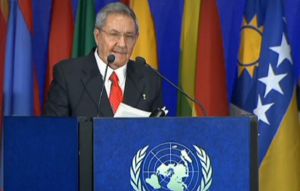 Cuban President Raul Castro, denounced that the global temperature rise will compromise first, integrity and physical existence of many countries and island nations, and will produce serious consequences to the Third World.
Cuban President Raul Castro, denounced that the global temperature rise will compromise first, integrity and physical existence of many countries and island nations, and will produce serious consequences to the Third World.
“Despite the milestone that marked the United Nations Convention on Climate Change, emissions of carbon dioxide increased by 38 percent between 1990 and 2009”, said Raul Castro speaking at the plenary session of the Summit United Nations Conference on Sustainable Development, Rio +20.
KEY REMARKS BY ARMY GENERAL RAUL CASTRO RUZ, PRESIDENT OF THE REPUBLIC OF CUBA, AT THE RIO+20 SUMMIT, JUNE 20-22, 2012.
Mrs. Dilma Rouseff President of Brazil:
Mr. Ban Ki-Moon Secretary General of the United Nations:
Excellencies:
Twenty years ago, on June 12th, 1992, in this same hall, Fidel Castro Ruz, leader of the Cuban Revolution, said: “An important biological species is at risk of disappearing due to the rapid and progressive elimination of its natural habitat: humankind.”
That which could have sounded alarmist then is today an irrefutable reality. The inability to transform unsustainable production and consumption patterns is challenging the balance and the renewal of the natural mechanisms that nourish the diverse forms of life on the planet.
The impact cannot be hidden. The species are extinguished one-hundred times faster than those found in the fossil records. Over five million hectares of forest are lost every year while nearly 60 percent of the ecosystems are impoverished.
Although the UN Convention on Climate Change was a landmark, the carbon dioxide emissions grew by 38 percent from 1990 through 2009, and currently we are experiencing a rise of global temperature threatening, first and foremost, the integrity and the very existence of numerous developing island states with serious consequences for countries of Africa, Asia and Latin America.
A profound and thorough investigation conducted in the past five years by our scientific institutions basically matches the reports presented by the Intergovernmental Panel on Climate Change and confirms that, if the current trends prevail, the present century will see a gradual but marked rise of the average sea level in the Cuban archipelago. The forecast includes the intensification of such extreme weather events as tropical storms and the increased salinization of underground water. These will have a grave impact all along the coastline; we are thus adopting the necessary measures.
Such phenomena would also have serious repercussions on the geography, demographics and economy of the Caribbean islands which must also tackle the inequities of an international economic system that leaves out the smallest and most vulnerable.
The fact that the negotiations have failed to reach an agreement that would help prevent the global climate change is a clear indication of the lack of political will and of the inability of the developed nations to act according to the obligations stemming from their historic responsibility and current standing.
Poverty spreads, hunger and malnutrition become greater and inequality increases, all of these aggravated in past few decades as a result of neoliberalism.
In the course of the past twenty years, new types of wars have been launched in the pursuit of energy sources. Such was the case in 2003, under the pretext of weapons of mass destruction that never existed, and more recently in northern Africa. The aggressions that now threaten Middle East nations will be followed by others aimed at controlling access to water and other resources headed for depletion.
It must be denounced that an attempt at a new distribution of the world will be conducive to a spiral of conflicts of unpredictable consequences for an already unsafe planet.
In the past two decades, total military spending has mounted to the astronomical figure of 1.74 trillion USD, almost twice that of 1992, dragging to the arms race other states whose safety is jeopardized. Two decades after the end of the Cold War, who will be the targets of such weapons?
Let’s put justifications and selfishness aside and work for solutions. This time everyone, absolutely everyone, will suffer the consequences of climate change. The governments of the industrial nations behaving inconsistently should avoid the grave mistake of believing that they will be able to live a little longer at our expenses. The waves of millions of hungry and desperate persons moving from the South to the North, and the peoples’ rebellion in light of such indolence and injustice would be irrepressible. At that point, no hegemony will be viable. May plundering end; May the war end; let’s move towards disarmament and destroy the nuclear arsenals.
We are impelled to produce a transcendental change. The only choice is to build societies with more justice and to establish a more equitable international order based on respect for everybody’s rights; to ensure sustainable development, particularly to the South nations, and to apply the achievements of science and technology to the salvation of both Earth and human dignity.
Cuba hopes that common sense and human intelligence will prevail over irrationality and barbarism.
Thank you.
Taken from PL
 Escambray ENGLISH EDITION
Escambray ENGLISH EDITION





Escambray reserves the right to publish comments.